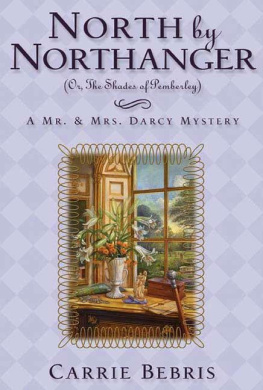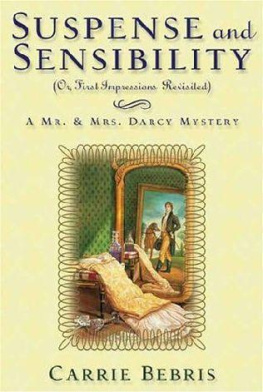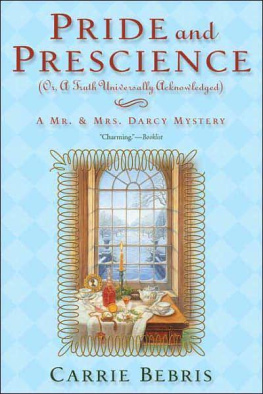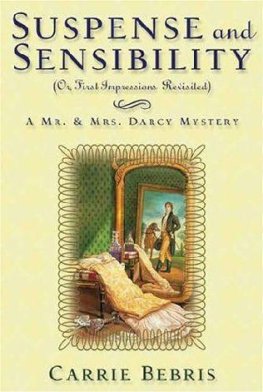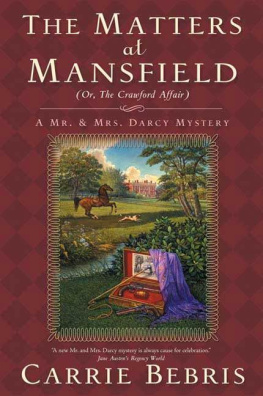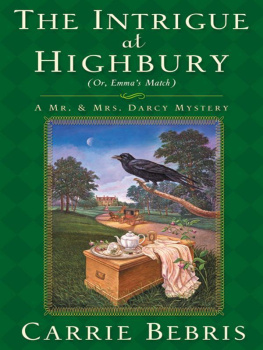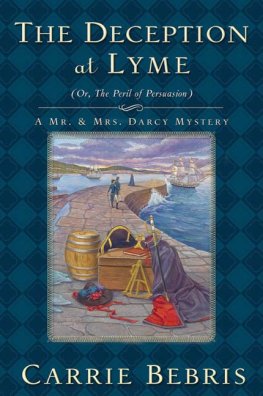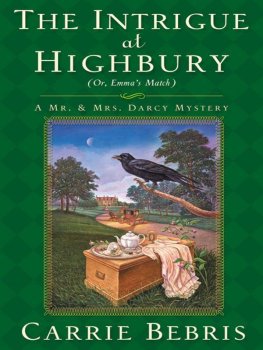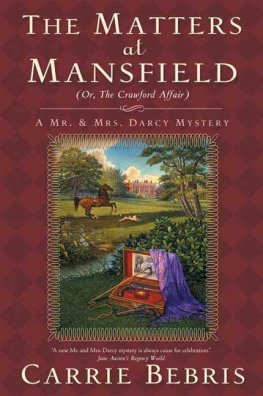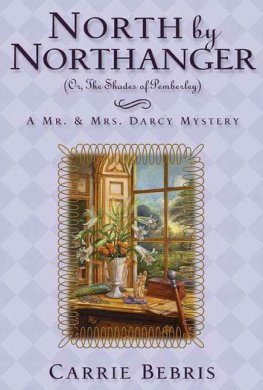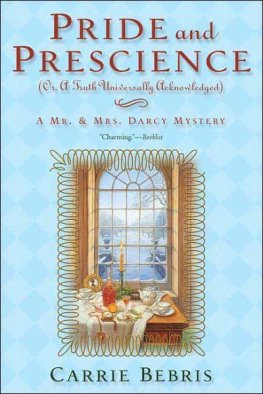Annotation
First, a mysterious letter from the late Lady Anne Darcy is discovered--propelling Elizabeth on a quest to learn more about Darcy's deceased mother and an unsettled matter she left behind. Then a summons to Northanger Abbey involves the young couple in an intrigue that threatens not just the Darcy family name, but Darcy's freedom as well. And just when it seems their situation could not grow worse, Darcy's overbearing aunt, Lady Catherine de Bourgh, takes up residence at Pemberley. Add to all this rumors of treasure and hints of deceptions old and new, and it becomes apparent that Pemberley is filled not with peace, but with secrets and spirits of the past--and that their exposure could profoundly affect the generation of Darcys to come.
Carrie Bebris
North by Northanger
or, the Shades of Pemberley
For my mother
Acknowledgments
Anyone who imagines that a book is written in isolation has never written a book. While I may have been on my own side of a closed door while committing most of the words to paper, many people have contributed to the creation of this novel by sharing specialized knowledge, editorial feedback, encouragement, and other aid vital to the care and feeding of authors and the creative process.
I, first of all, thank my family for their patience and support; this includes not only my immediate family, who kept me grounded in the twenty-first century, but also my parents and siblings, who lent me quiet places to write when I had to escape to the nineteenth.
I also thank Anne Klemm: friend, brainstorming partner, critical reader, and intrepid travel companion. By the time I sent this manuscript off to my editor, I felt as if I had given birth along with Elizabeth Darcy, and if the book had a midwife, it was Anne.
Speaking of my editor, I appreciate Brian Thomsen for his guidance and suggestions; his assistants, Natasha Panza and Deborah Wood, for helping shepherd my "baby" through the publishing process; and David Moench and Fiona Lee for their enthusiastic promotion of the Mr. & Mrs. Darcy series. I thank Teresa Fasolino for her lovely cover art and for inspiring my use of Madonna lilies in the plot. And I am grateful to my agent, Irene Goodman, for her advice, sagacity, and belief in me and my writing.
Many fellow authors lent support in various ways. I thank Maddy Hunter for her friendship, cheer, and for sharing a story one afternoon about her grandmother's lost rings. Victoria Hinshaw, Dee Hendrickson, and other members of the Beau Monde Society offered Regency-era expertise. Susannah Fullerton sent her book Jane Austen & Crime express from Australia just when I needed it, then graciously answered a multitude of follow-up queries.
Experts in numerous fields kindly answered countless research questions. I am grateful to Canon Chancellor Edward Probert, Salisbury Cathedral; Dr. Tim W Machan, professor and chair, Marquette University Department of English; Professor John Childs, School of History, University of Leeds; Professor William Cornish, Faculty of Law, Magdalene College, University of Cambridge; Susan Haack, M.D.; horticulturist (and dear aunt) Ann Wied, University of Wisconsin Extension; lily growers Ed McRae, Darrel Roeder, and Eugene Fox; quilters Rebecca Murphy and Reesa Evans; and horse enthusiast Linda Gies.
Appreciation goes across the Atlantic Ocean to Sue Hughes and the staff of the Jane Austen Centre in Bath, England, for their warm reception, and to members of the Jane Austen Society of North America, Wisconsin Romance Writers of America, and the Great Dames for their support closer to home.
Finally, I thank the librarians, booksellers, and readers who have embraced the Mr. & Mrs. Darcy mysteries and shared their enthusiasm with others. You make writing the series a true pleasure.
"Your alliance will be a disgrace...
Are the shades of Pemberley to be thus polluted?"
-- Lady Catherine de Bourgh to Elizabeth Bennet,Pride and Prejudice
One
At that moment she felt that to be mistress of Pemberley might be something!
--
Pride and PrejudiceLess than a year into the marriage that made her mistress of one of England's finest houses, Elizabeth Darcy knew she still had much to learn about the place she now called home. Of one thing, however, she was certain.
A ghost haunted Pemberley.
She was not a ghost in the traditional sense. She did not moan, or shriek, or rattle chains. She did not cause rooms to grow cold, objects to fall, or fires to sputter. She did not manifest at midnight to pace on creaking floorboards, visiting in death the rooms she had occupied in life.
Yet the continued presence of Lady Anne Fitzwilliam Darcy was as real and pervasive as that of any spectre. And far more difficult to exorcise. Though her corporeal form had been laid to rest nearly twenty years earlier, she inhabited the estate as if it were still hers, casting a shadow so long that her daughter-in-law wondered whether she would ever escape it.
Elizabeth had known coming into her marriage that she entered a family and a house with a long, respected history. She had embraced that history, and her new place in it, as she had embraced her husband and the life he had offered her when they wed. She had thought she was prepared for her new role as mistress of Pemberley. She had not realized that the previous occupant had not yet vacated it.
"You are -- you are certain, ma'am?"
Elizabeth left the corner of the small parlor and crossed to a spot nearer the center of the room. "Yes," she assured the housekeeper. "Quite certain. I would like the desk moved over here, facing the window."
"Of course. I will summon the footmen directly." Despite her statement, Mrs. Reynolds made no move. The white-haired housekeeper lingered in the doorway of Elizabeth's morning room, worrying her lower lip, apparently wishing to say more but holding back out of deference to her employer.
Circumstances had prevented Elizabeth from spending much time at Pemberley since marrying Fitzwilliam Darcy nine months ago, but in that period she had come to respect Mrs. Reynolds's intelligence and opinions. One did not casually dismiss the concerns of a trusted servant with twenty-five years' tenure, and the housekeeper's advice had proven critical in easing Elizabeth's adjustment to overseeing a house far grander than the ones she had known growing up. Mrs. Reynolds was both extremely capable and unquestionably loyal to the Darcy family.
Sometimes too loyal. Guessing the source of the housekeeper's reservations, Elizabeth nevertheless asked, "Is there any reason not to move the desk, Mrs. Reynolds?" She resigned herself to the anticipated reply.
"Her ladyship preferred it in the corner. At certain times of year, this part of the room receives very strong sunlight. Lady Anne found the glare unpleasant."
Lady Anne, Elizabeth had been given to understand by various members of the household, had also found the Wedgwood breakfast set superior to any of Pemberley's many others, particularly the Royal Worcester china Elizabeth had thought to use last week. The fortnight previous, she had learned that the pattern of the music room's wallpaper was the only possible one that could adequately complement the view from that chamber's windows. The bird motif of the conservatory, another selection of her predecessor's, Elizabeth did not dare touch. Further, Lady Anne's taste in decorating had apparently been matched by equal excellence as an art collector, hostess, domestic manager, and philanthropist. As a result, Elizabeth had begun to find the glare of Lady Anne's perfection growing unpleasant.

